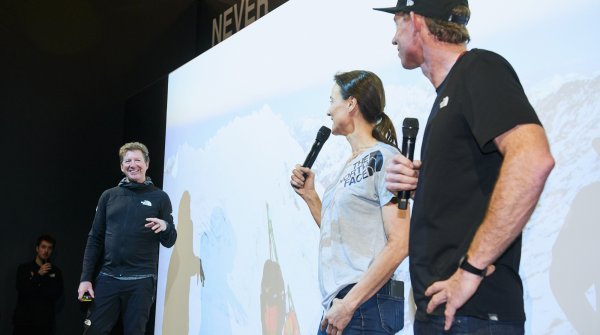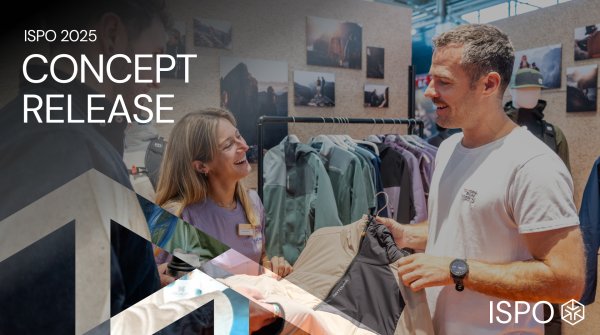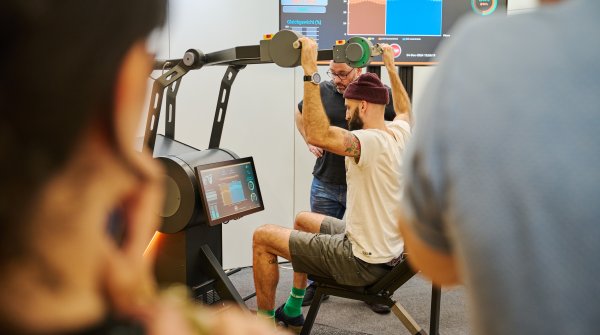Climbing teaches you to focus completely on yourself, you're out in the fresh air and you're doing something good for your health - including your mental health. Health has become a megatrend, and not without reason: it influences not only our performance in sports, but our entire everyday life.
Alpine climbing allows me to grow beyond my limits and get to know myself in a completely different way. I can still remember my first alpine climbing tour quite well: mental cinema, little confidence in the equipment and rope salad at its best.
Three intense years later, I can say that alpine climbing is an experience for life.

- Learning about and pushing boundaries
- Discipline and perseverance
- Dealing with setbacks
- Trust in your own abilities
- Keeping calm
- Trust in your partner
- Concentrate on the essentials
- Valuing security
- Remain humble
Since the first day, I have been working on my limits. Limits that were very close at the beginning are expanding, moving into the distance. This comes with increasing experience: because every climb I do gives me so much new.
Especially on alpine tours, I reach my limits from time to time; but that doesn't have to be a bad thing. On the contrary, if you know your limits, you can push them if you stick to them - and that doesn't just apply on the mountain.
When you're in the middle of the route, or you've reached the summit, you can't just say, "Well, I don't feel like it anymore, I'm going to stop now". It doesn't matter if you are already tired or just don't feel like it anymore. You always have to go back to the valley.
Everyone who tries alpine climbing will sooner or later realize: If you climb up, you have to climb back down. But I've also applied that to my everyday life.
When I start a task, I finish it and don't stop in the middle. That makes my everyday life a lot easier and is also great for my professional career.
Whenever I have a motivational hole, I say to myself, "You can do that on the mountain. Then you can finish your tasks at home just as well under simplified conditions." For me, that works wonders.
No, not every tour will be crowned with success. In the beginning, I was so set on making every tour work.
But this attitude was quite wrong, as it turned out. The real strength and greatness in alpine climbing lies in being able to recognize dangers and also to turn around sometimes.
Reckless action is out of place here, at least if you want to live a long time. It is not always easy to cancel a tour - and unfortunately not always possible.
However, you learn to assess the dangers, to make a decision, and most importantly, to be at peace with that decision.
I used to think that turning back was only for the weak. But now I listen to my gut feeling: it's better to turn back once too often than never to come back at all.
Especially in alpine climbing, you don't need to fool yourself: if you are sure that a route is not going to work because your skills are simply not enough, you learn how to communicate that to yourself.
But sometimes it's just your head going crazy and whispering to you, "You can't do it!" That has happened to me often enough.
Over time, however, you learn to properly assess your skills and ability and decide if you really should abandon a route or if you are fooling yourself.
By the way, this also applies to everyday life: You build confidence in yourself and your abilities. That way, you can better master daily tasks and hurdles and also sometimes say, "You can't do it!" and get help.
Something can always go wrong in alpine climbing, no matter how experienced and how well prepared you are. The weather changes, you can't find the entry point, you get stuck in the wall. That can quickly become critical.
The key is not to panic and to keep a cool head. However, that's often easier said than done: at first, I found that extremely difficult. Even in situations that I had actually mastered, it was all over me.
My heart started racing, tears welled up in my eyes, and I started to panic. The only problem is that this will not help you in any situation.
I had to start having a dialogue with myself, "Okay, it's critical right now, but I can use my skills to get out of this situation. I need to stay calm." Then I take a deep breath first, try to assess the situation, and look for possible solutions.
I do the same thing in everyday life: I don't lose my nerve as often, no matter what it's about. I breathe deeply. And I keep calm and look for solutions.
Alpine climbing teaches you to rely on others. Strictly speaking, you have to entrust your own life to your climbing partner. Sooner or later you get to know the strengths and weaknesses unfiltered. Rope teams are often a pair in private life as well.
Of course, you can also benefit privately from this built trust - I speak from experience. The shared experiences, the hurdles overcome, strengthen the relationship and also help in everyday life to master problems and to be able to count on the other in every situation.
When alpine climbing, it's best to leave problems at home. At the latest when you stand at the start of a climb, the problems of home are far away: you have to be in the here and now. Only the moment should count. Everything else is unimportant at that moment and would be too much of a distraction anyway.
I can now apply this filter quite well in everyday life. I manage to block out everything else and concentrate only on the essentials.
There is hardly anything better than arriving home after a long, successful climbing or multi-day tour. Suddenly the sofa is especially cozy, the bed softer than before.
Well, sometimes during the tour I think to myself: "I should have stayed at home. But in the end I'm always happy when I've completed an alpine climbing tour.
When you stand in the middle of a wall, you only realize how tiny you actually are. So often I've been amazed at how little influence we have on our nature.
The mountains set the tone; we ourselves can only see that we act to the best of our knowledge and conscience, adapt and call on our experience so that we can be as safe as possible on the road.

 OutDoor by ISPOOutDoor in transition
OutDoor by ISPOOutDoor in transition
- Awards
- Mountain sports
- Bike
- Fitness
- Health
- ISPO Munich
- Running
- Brands
- Sustainability
- Olympia
- OutDoor
- Promotion
- Sports Business
- Textrends
- Triathlon
- Water sports
- Winter sports
- eSports
- SportsTech
- OutDoor by ISPO
- Heroes
- Transformation
- Sport Fashion
- Urban Culture
- Challenges of a CEO
- Trade fairs
- Sports
- Find the Balance
- Product reviews
- Newsletter Exclusive Area
- Magazine




